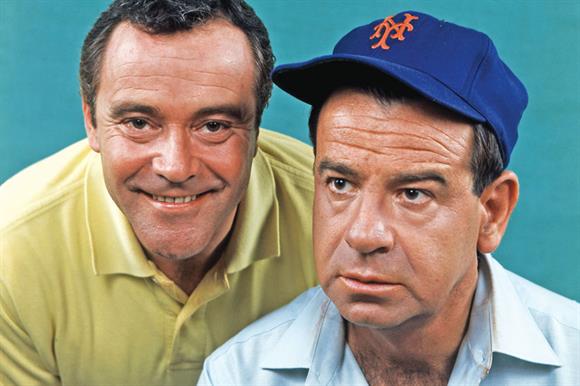Not every pairing is a perfect match. Everyone has their
idiosyncrasies that only suits them. It's this part of living with someone
else, one must learn to accept those differences. There's a give and take when
it comes to these kinds of set ups. During the mid 20th century and before,
married folks were under much more pressure to maintain their vows. If a
divorce occurred, it was frowned upon, so many stuck it out. However, if one
partner did leave the other, sometimes it was never brought to light. As time
has progressed though, the notion of marriages not lasting forever isn't as
uncommon. But would any of the separated ones hang out with another person from
another divorce? Well look no further than to Neal Simon's film adaptation of
one of his famous plays. Best known for putting the show on Broadway, Simon
took it to the next step by writing a screenplay for the film.
 |
| "Smile at the camera Oscar..." |
The story follows two men divorced by their wives that find
some level of compensation through each others' tendencies. Oscar Madison
(Walter Matthau) is a slob who can't get his act together for anything,
especially maintaining any sort of common cleanliness. Felix Ungar (Jack
Lemmon) is the exact opposite. He finds keeping things neat and tidy something
that's fulfilling. However, Ungar took it to the extreme; finding almost
EVERYTHING not to his liking because it was no according to his level of order.
Yet somehow the two boneheads manage to make it work, at first. Until they
start to realize how polarizing their preferences are, that's when things go
bananas. And for what's shown, the execution is well done thanks to director
Gene Saks. He may have not directed that many films in his lifetime, but he did
helm Barefoot in the Park (1967), Cactus Flower (1969) and Brighton Beach
Memoirs (1986).
There's a great mix of comedic timing and writing handled by
the actors and Simon's writing. Jack Lemmon and Walter Matthau are a funny duo
in this feature film. Lemmon perfectly drives up the hypochondriac scale past
its peak, making cleaning and timeliness feel way more important than it should
be. While Matthau distorts any sort of reality by feeding his guests with
varying color assorted sandwiches. But of these two, the actor who steals the
show was Matthau. His comedic talent shines through with some of the most
hilarious lines ever spoken. And though what's said at times may not make sense
immediately, the reasoning can be validated. There's also appearances from Herb
Edelman, John Fiedler, David Sheiner, and Larry Haines, who play Oscar and
Felix's gambling buddies. They two have their funny moments. One of the greater
interactions however performed between Matthau and Lemmon were with Monica
Evans and Carole Shelley.
These two actress really nailed their skills in sounding
like sisters. Their giggles and reactions to either Matthau's and Lemmon's
lines or themselves is well articulated and timed. Walter Matthau was known for
several films like JFK (1991) and Grumpy Old Men (1993). Jack Lemmon is best
known for other films too like The Great Race (1965), Airport '77 (1977), Short
Cuts (1993) and Hamlet (1996). Both would also star in The Odd Couple II
(1998). John Fiedler was best known for playing Piglet in all the Winnie the
Pooh related films up until his passing in 2005. Herb Edelman was mainly a TV
actor in shows like The Golden Girls and The Love Boat. The same could said for
David Sheiner and Larry Haines. For Monica Evans, her career would not go much
further but she would still voice Abigail from Disney's The Aristocats (1970)
and Maid Marian from Robin Hood (1973). Carole Shelley also voiced characters
in those two films but also voiced Lachesis from Hercules (1997).
 |
| Felix and Oscar's gambling buddies |
The only component to not really come out looking unique was
the camerawork. Provided by Robert B. Hauser, the cinematography is adequate
for the movie. The problem is that it just doesn't have a real iconic setting.
Sure, Oscar Madison's apartment is one of the more well known places to be
featured in a movie, but it's just an apartment. The camera lens is wide enough
to take all of the den and then some. Yet the audience only gets a good view of
that, the kitchen and the main hallway. There's a bunch of other rooms but
they're not explored that much either. Hauser also filmed for The Sweet Ride (1968),
How to Steal the World (1968) and Soldier Blue (1970). For the film score, Neal
Hefti brought the popular main theme to life. Although he only scored for a
couple other films after, it would be this motif that would forever make his
name recognizable. Throughout the movie, music isn't that abundant. But when it
is, it's a classic sound.
Points Earned --> 8:10
No comments:
Post a Comment